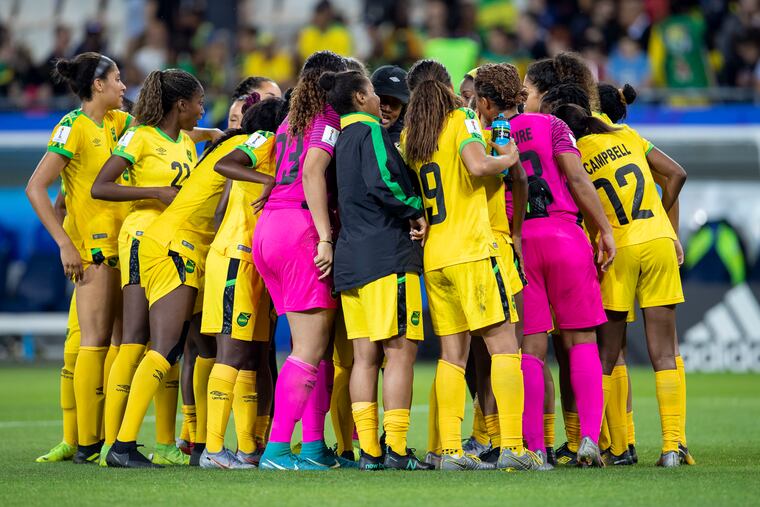Jamaica women’s soccer team still in financial peril despite World Cup success
Former coach Hue Menzies hasn’t received half of the pay in his contract, and players still haven't received some bonus money from the World Cup.

Over the last few years, the Jamaican women’s soccer team has been one of the great success stories in the sport.
In 2018, the Reggae Girlz upset favored Costa Rica in World Cup qualifying, then edged Panama in a penalty shootout to clinch the nation’s first-ever World Cup berth.
While in France, they won fans’ hearts worldwide with their spirit and effort. The team’s first-ever World Cup goal, scored by Havana Solaun in the group stage finale against Australia, was one of the tournament’s most memorable moments.
Jamaica’s story was made more compelling by what it took for the program to make the climb. Because the Jamaican Football Federation did not fully fund the program, Bob Marley’s daughter Cedella stepped in to help.
After the World Cup, there was widespread hope that the team’s newfound success and attention would push the JFF to step up. The governing body did not pay players stipends agreed to in a new contract, leading those players to threaten a boycott of the early rounds of Concacaf’s qualifying tournament for this year’s Olympics.
The boycott ended up not happening, and Jamaica advanced to the main qualifying tournament, which starts next week in Houston and Edinburg, Texas.
But still, not all is well. Hue Menzies, who coached the Reggae Girlz to and in France, resigned last month amid a pay dispute of his own. He said that he still hasn’t received half of the pay in his contract, plus some reimbursements he is due. Menzies and the players also still have not received some bonus money due them from the World Cup.
Assistant coach Lorne Donaldson left the program earlier this month, after initially staying on to help with the head coach transition.
“Everything was at a stalemate with us, with the Federation, and I felt like if we stepped away, somebody else could come in and start the negotiations,” Menzies said. “It became pretty personal with me.”
Menzies and Donaldson are both based in the United States, the former in Florida and the latter in Colorado. The youth club Donaldson works at, Real Colorado, produced U.S. World Cup winner Mallory Pugh and this year’s No. 1 NWSL draft pick, Sophia Smith.
In a speech at the United Soccer Coaches convention — that drew only a few dozen people, an hour after Jill Ellis drew hundreds to the same room — Menzies and Donaldson offered details of just how much they had to do from their own pockets.
Because the Jamaican federation did not expect the team to reach the final round of qualifying, the team did not have winter coats to wear when a cold snap greeted their arrival in north Texas from the state’s south coast. So Menzies went to Costco to buy coats.
A pre-World Cup training camp in Scotland was set up for late May and early June. When the team arrived at the Miami airport to fly over, the players found out that the flights hadn’t actually been booked. When they finally got there, the bus driver who would take the team to training hadn’t been paid.
They even had to pay for some training in France before the World Cup started, when everything went on FIFA’s bill.
Donaldson noted that neither the president nor the vice president of the JFF attended the World Cup qualifying win. Instead, they attended the men’s team’s early-round Concacaf Nations League game at lowly Bonaire.
“That alone tells you they didn’t care,” Donaldson said.
Jamaica’s public has started to care, though, and many Americans have too — including former U.S. women’s team coach Jill Ellis. The two-time World Cup champion has been a mentor for Menzies, fully understanding the privilege of the Americans’ vast resources.
“She understands the struggles, what it takes to get to the World Cup, to go in and perform,” Menzies said. “She kept just getting me through things. Great support from Jill, and I really appreciate everything she’s done for me.”
Despite the continued lack of proper funding, Menzies believes the Reggae Girlz can qualify for the Olympics under new coach Hubert Busby. Marley helped pay some of the outstanding debts this winter, for which the JFF publicly thanked her — and of course left out its failure to spend its own money on the team.
“It's going to be tough, but I'm not going to slight these kids,” Menzies said. “They’ve been through a lot, and they've proven us wrong every time we step on the field. I still feel like there's a chance for these kids.”
The Olympic qualifying squad includes Solaun, the Washington Spirit’s Cheyna Matthews, and the Houston Dash’s Kayla McCoy. The biggest star is playmaker Khadija “Bunny” Shaw, who signed with French club Bordeaux last June after lighting up college soccer at Tennessee.
Two other players on the team were drafted into the NWSL this month: UCF defender Konya Plummer (Orlando Pride) and Rutgers defender Chantelle Swaby (Sky Blue FC). Plummer wore the captain’s armband at the World Cup.
This week, Union goalkeeper Andre Blake, captain of the Jamaican men’s team, gave the Reggae Girlz strong backing.
“They really do deserve to be treated in the right way,” he said. “Whatever it takes to make it happen, it’s got to happen, and I just feel like sometimes they have not been treated in the way they’re supposed to.”
At the end of Menzies and Donaldson’s convention presentation, they played a video of Solaun’s historic goal. For a fleeting moment, the electricity of that famous night in Grenoble came back.
Then it disappeared again, as the sparse crowd made its way out.